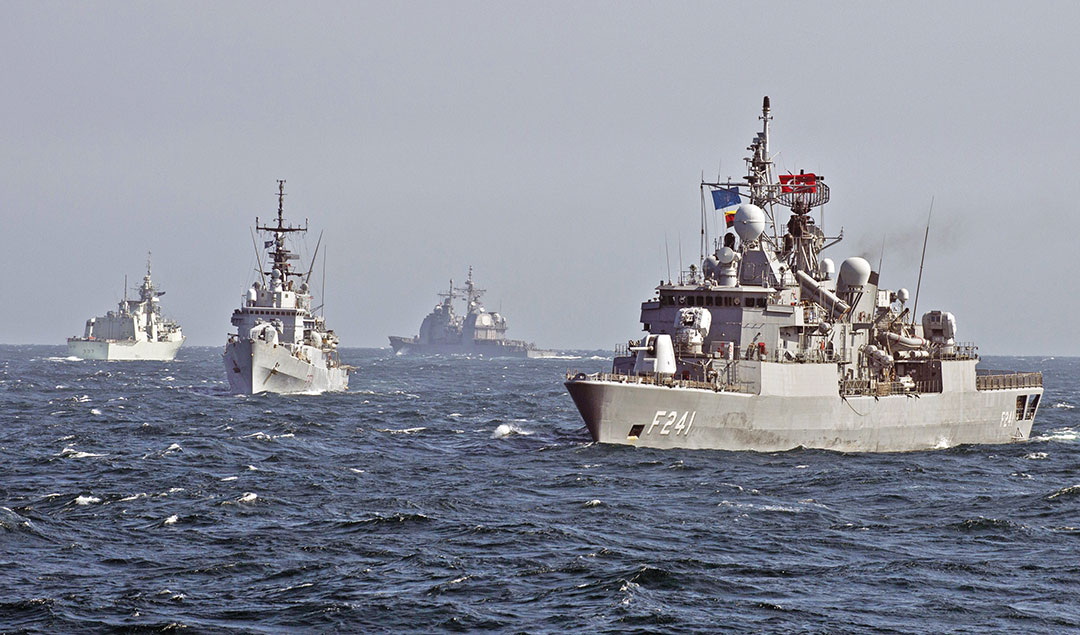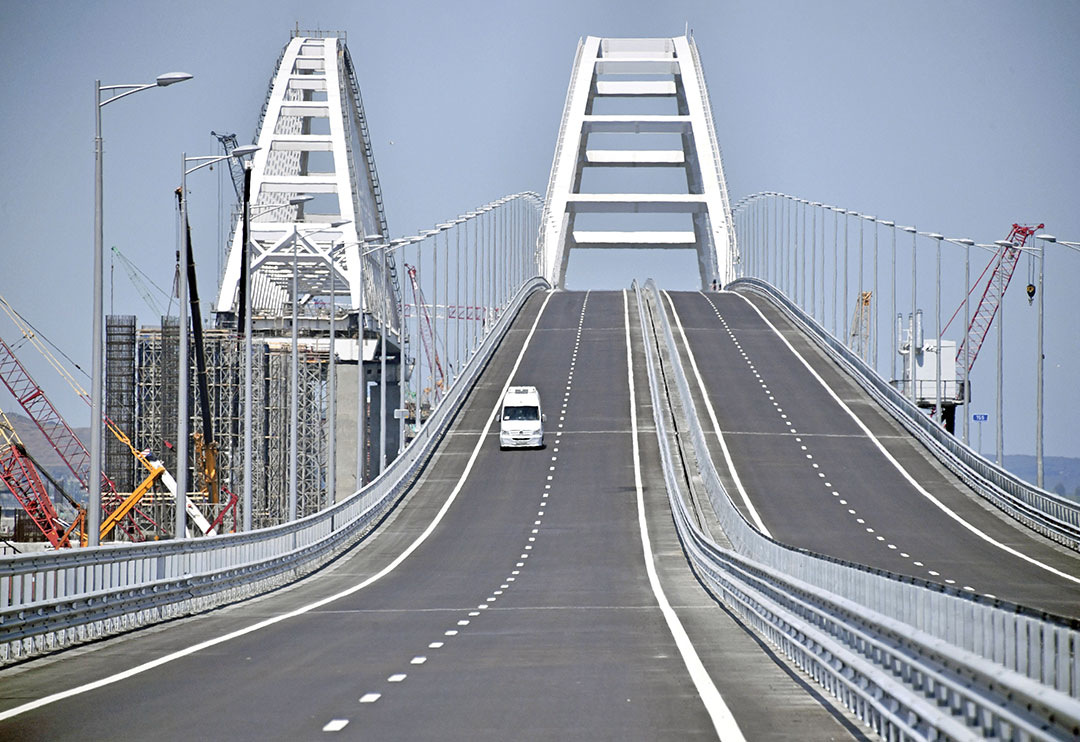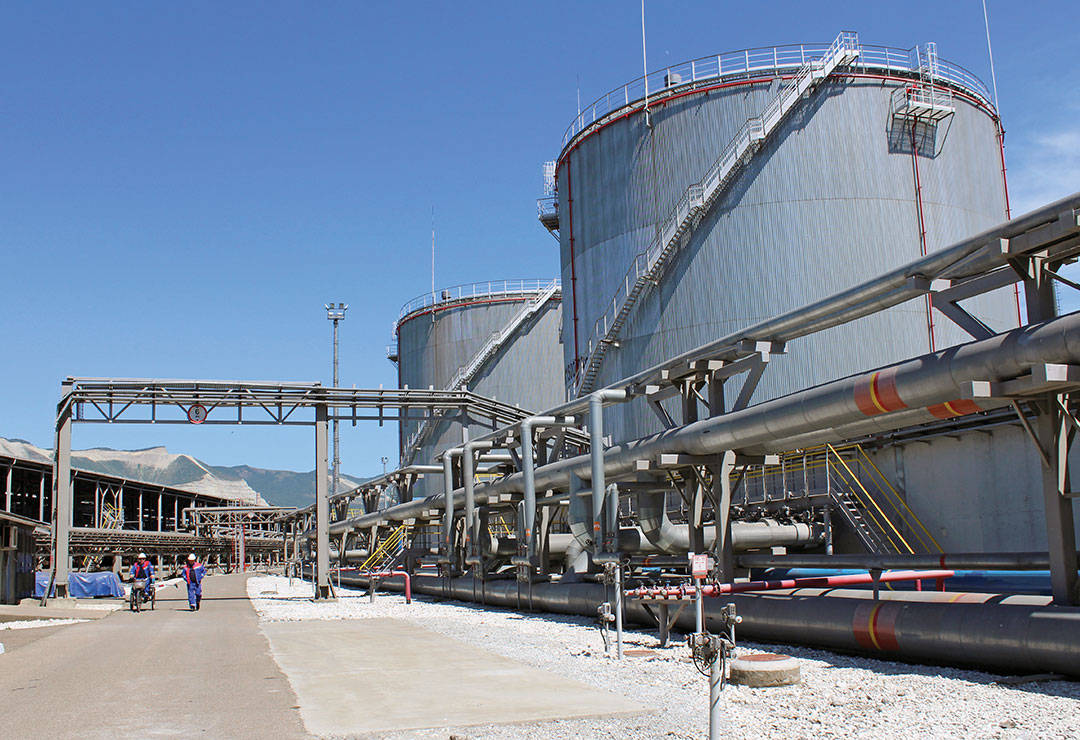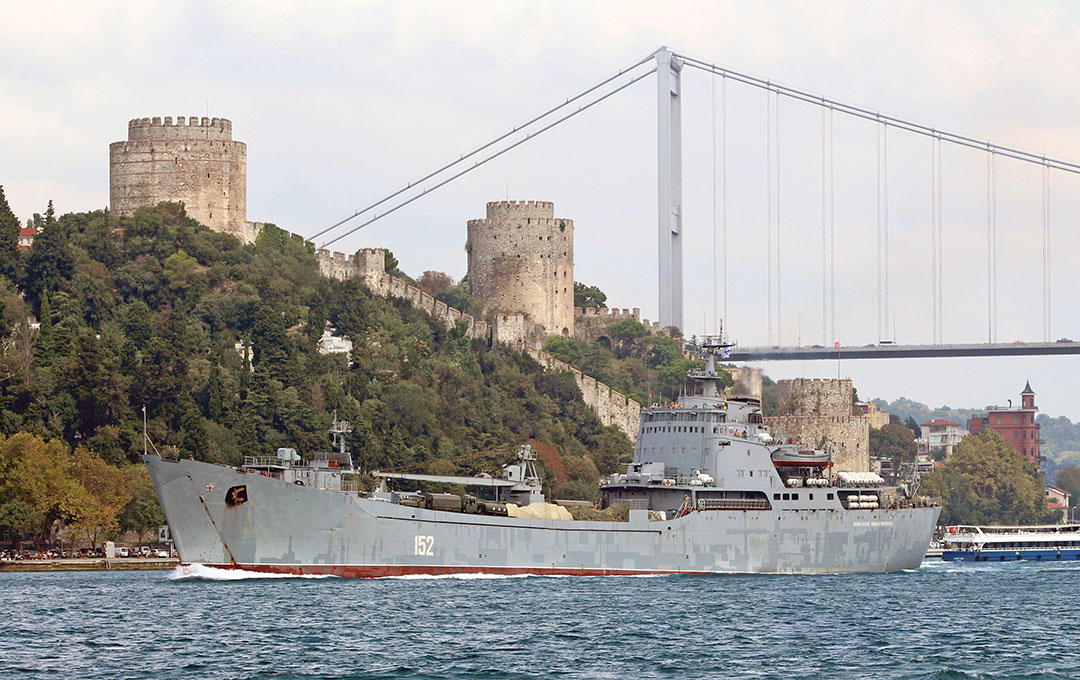Cooperation and confrontation on the Black Sea
By Natia Gvenetadze, Ministry of Defence, Republic of Georgia
Recent developments in the international system have increased the complexities of global security structures, not least of which is the resurgence of Russia as an ambitious regional and global power. When Russia demonstrated a capacity to launch proxy operations across its near abroad, NATO and Western-aligned countries in the region proved incapable of consolidating and exhibiting an effective counterstrategy. In 2014, then-NATO Secretary-General Anders Fogh Rasmussen characterized Russian military aggression as “the most serious crisis in Europe since the fall of the Berlin Wall” and declared that NATO “can no longer do business as usual with Russia.”
Russia’s efforts to restore its pre-Cold War, Soviet-style regional supremacy include a number of hybrid operations in the Baltics, Eastern Europe and, most recently, in the Black Sea region and Eurasia. Russia is mainly focusing on soft power to challenge the West without crossing red lines. Many experts agree that Russian policy is driven by its desire to restore its “great power” status. The annexation of Crimea, following Russia’s 2008 invasion of Georgia, is an indicator of the Kremlin’s evolving military strategy in the Black Sea region.
Any discussion of the new Russian Black Sea agenda must touch on its historical aspects. The Black Sea was referred to as a “Soviet lake” during the Cold War. After the collapse of the Soviet Union, the Black Sea region became less geostrategically significant for the West, according to Boris Toucas of the Center for Strategic and International Studies, “but it remained instrumental in shaping Russia’s concept of its ‘near abroad.’” Russia lost its most important geopolitical and trade corridors in the region. Black Sea ports had given the Soviet Navy a regional stronghold to control trade routes for goods and energy, and to influence the littoral states, Gunnar Åselius explains in The Rise and Fall of the Soviet Navy in the Baltic 1921-1940.
After the Cold War, the region was relatively stable in the new unipolar world absent a strong Russia with “great power” ambitions. Today, however, as BBC News’ Jonathan Marcus said, Russia “is back with a vengeance, eager to consolidate its position nearer home; to restore something of its former global role and to make up for perceived slights perpetrated by the West.” The Black Sea region is once again in the spotlight of a new balance-of-power struggle between Russia and the West.
Regional significance
In classical geopolitical terms, the Black Sea region is considered fundamental to Euro-Asian stability and security due to its geostrategic importance as an intersection of east-west and south-north corridors. The region’s geographical location has always placed it in the spotlight of great-power interests, which is probably one of the main factors constraining progressive integration and practical cooperation there.
The region has a complex array of existing reactive and frozen conflicts. The conflicts in Abkhazia, South Ossetia, Nagorno-Karabakh and Transnistria have been innate to the region since the Soviet collapse and the re-emergence of newly independent states. The escalation of some of these existing conflicts has been aggravated by the initiation of new ones in Ukraine, in the Crimea and the Donbass. The region’s unresolved conflicts not only hamper opportunities for cooperation and partnership among regional actors, but they also stimulate further destabilization and negatively affect the region’s security environment.
Theoretically, the Black Sea region is geographically important for the cross-regional trade and transit of goods and energy resources. Practically, it is a playground of power politics. For this reason, its significance is often discussed with reference to the interests of major regional and international powers such as Russia, the United States, NATO and Turkey.

Three interdependent dimensions define the region’s significance: security, trade and energy transit routes. The region’s importance as a trade and transit corridor greatly enhances the strategic security interests of regional and global powers. With its proximity to gas and oil in Russia and the Caspian Sea, the Black Sea region is a significant global transit zone for current and planned oil and gas pipeline routes connecting Europe, Russia, Central Asia and the Middle East.
Europe, which is largely dependent on gas and oil transiting this region, is looking for ways to diversify its energy imports to secure them from an unpredictable Russia. One of these is the Southern Gas Corridor, which is designed to diversify the European Union’s natural gas imports. However, the Black Sea region could also host alternate delivery routes for Russian-supplied energy.
The Black Sea has also become a logistical center for Russia’s naval operations in the eastern Mediterranean Sea. By annexing Crimea, Russia has increased its status as a maritime power. Russia plans to modernize its fleet and construct new bases, and seeks to improve its military advantages in the region. Janusz Bugajski and Peter B. Doran of the Center for European Policy Analysis point out in a 2017 paper: “Its Black Sea fleet is positioned to deny military access to the Caucasus and Ukraine. The integration of Crimea provides Russia with an additional coastline of several hundred kilometers, together with the crucial Black Sea port of Sevastopol.” This is in addition to the 220 kilometers of Black Sea coastline Abkhazia provides Russia.
However, the Turkish Navy is still the most powerful in the region. Turkey maintains a leading role in the Black Sea security framework, where it actively supports its policy of preventing external powers from dominating the region. Turkey has traditionally controlled the Bosporus strait, a privilege granted by the Montreux Convention, although considering Russia’s aggressive politics and considerable military advantage, it will be difficult for Turkey to continue its traditional policy toward the Black Sea. Turkey will need to find a balance in its cooperation with Russia and NATO relative to Black Sea security. Russia’s current upgrading of its Black Sea fleet and desire to dominate the region complicates the situation.
Russia’s regional interests
Russia sees the Black Sea region as vital to its national security and its trade and transit of energy. Russia’s economy relies heavily on being an energy provider, making it important to control pipeline routes.
Russia has always been the biggest regional power in both economic and military terms. “Russia still views security in terms of geography and realpolitik,” Oksana Antonenko and Bastian Giegerich explain in their article in Survival, and regards neighboring countries to its west as crucial to its security. Although, after the collapse of the Soviet Union, countries gained their independence and started to build their own domestic and foreign policies, Russia still is far from accepting this as a reality and “considers the region to be a sphere of its exclusive influence or, as former Russian President Dmitry Medvedev has put it, Russia’s ‘zone of privileged interest,’” Tracey German writes in a 2014 paper for the Strategic Studies Institute at the U.S. Army War College.

AFP/GETTY IMAGES
Russian President Vladimir Putin’s strategic ambition is to restore Russia’s international power and limit NATO’s influence. Toucas points out that the main theme reflected in Russia’s national security strategy of 2015 and its military doctrine of 2014 is “the Kremlin’s overarching obsession with fragmentation and subversion, especially in the Black Sea and Caucasus regions.” This reflects the fact that “the Russian military elite see regaining Crimea as momentous in restoring strategic competences,” according to a 2015 Chatham House paper.
Putin has referred to Russia’s resurgence as “restoring historical justice.” Aware that it failed to contain NATO’s enlargement into Romania and Bulgaria, Russia sought every opportunity to prevent further expansion of the Alliance to its immediate borders. Therefore, Russia’s aggressive policy in the Black Sea region is intended to diminish NATO’s role there. The heavy militarization of the region, supposedly for preservation, enhancement and advancement of these embedded Russian interests, has been the most significant aspect of Russia’s regional activities. According to Bugajski and Doran: “The purpose of this modernization is to build a combined arms force that can deny access by NATO to the Black Sea and project power outward and threaten U.S. and NATO interests in the Mediterranean and Middle East.”
NATO’s Black Sea interests
NATO’s modern engagement in the Black Sea dates to the period after the dissolution of the Soviet Union. Because of its distinct geographic location, the region acquired an important role for the West in addressing emerging security challenges and fighting the global war on terror. NATO member states, therefore, realized that they “require unfettered access to the Black Sea region for ensuring security in the Balkans and Middle East. The region is critical for NATO’s communication and access to Afghanistan for managing the postwar transition. Securing the regional energy infrastructure through the Black Sea region is vital for meeting Europe’s energy needs,” writes Sharyl Cross in the journal Southeast European and Black Sea Studies.
In terms of security, “NATO’s strategy in the Black Sea region is guided not only by the rivalry with Russia but also by terrorism, proliferation and energy concerns,” Nadia Alexandrova-Arbatova writes in her contribution to The Wider Black Sea Region in the 21st Century: Strategic, Economic and Energy Perspectives. At its 2016 Warsaw summit, the Alliance recognized the strategic importance of the Black Sea and the need to enhance cooperation among members and partners. Also, recognizing that current developments in the region bring serious challenges to NATO credibility, Secretary-General Jens Stoltenberg acknowledged the possibility of increasing Alliance military capabilities in the region.

Russia and NATO
Historically, the NATO-Russia relationship has been described as one of “problems, mistrust and misperceptions; the relationship could hardly be characterized as a true partnership,” according to Antonenko and Giegerich. Russia views NATO as an anti-Russian organization that remains a threat to its security, despite the clear statement in NATO’s founding document that the Alliance is defensive and not directed against anyone. Russian policymakers also view NATO as an instrument of U.S. policy in both Europe and Eurasia.
What appears to be real about NATO-Russia relations in the Black Sea region is that red lines have been crossed for both sides. The Russian president declared as long ago as 2008 that: “We view the appearance of a powerful military bloc on our borders … as a direct threat to the security of our country.” On the other hand, then-NATO Deputy Secretary-General Alexander Vershbow characterized Russian activities this way in 2015: “To the East, Russia has torn up the international rule book. It has returned to a strategy of power politics. It threatens not just Ukraine, but European and global security more generally. … Russia’s aggression against Ukraine is not an isolated incident, but a game changer in European security.”
It is widely believed today that the balance of power in the Black Sea region is changing in Russia’s favor. Russia well understands the importance of the Black Sea for the projection of its interests and is using an aggressive approach to become the dominant actor in the region. Russia sees NATO’s expansion as a threat to its national security and will do anything to block NATO from becoming dominant in the region. However, NATO is already present, considering that three littoral states are Alliance members. Russia’s considerable military superiority in the region and its aggressive policy are alarming to NATO and are seen as a challenge to Euro-Atlantic security as a whole.
The final communiqué of the NATO Warsaw summit highlighted the importance of the Black Sea region: “We face evolving challenges in the Baltic and Black Sea regions. … Russia continues to strengthen its military posture, increase its military activities, deploy new high-end capabilities, and challenge regional security. These developments have resulted in increased unpredictability that could be mitigated through reciprocal transparency and risk reduction measures.” Validating this assessment, former NATO Supreme Allied Commander Europe Gen. Philip Breedlove warned in 2014 that Russia’s militarization of the Crimean Peninsula would have an effect on most of the Black Sea.
A fever for recreating a buffer zone on its western borders has pervaded Russian leadership for a long time. “It started with the trauma of the fragmentation of the Soviet Union, the voluntary demise of which Vladimir Putin later called ‘the greatest geopolitical catastrophe of the 20th century,’” Toucas says. By invading Ukraine, Russia shattered the belief that war was inconceivable. Russia has succeeded in transforming the West’s restrained reaction to its violations of the fundamental principles of European security into a strategic advantage and continues to aggressively pursue its interests in the region. In November 2018, Russian ships seized Ukrainian naval ships and sailors on the Black Sea in defiance of established maritime law.

Conclusion
Although long neglected, the Black Sea region is now experiencing strategic competition among multiple actors with conflicting interests. But there is no comprehensive strategy to counter Russia’s aggressive policy in the region. “The geopolitical ‘grand chessboard’ in the Black Sea area is being reordered, with the Euro-Atlantic community on the one side and Russia on the other seeking to reconfigure their overlapping spheres of influence in the aftermath of the Crimean crisis,” European security blogger Raluca Csernatoni writes. From a practical point of view, the crisis in Crimea “illustrates the limit of the European attractiveness as well as the retrenchment of U.S. influence from the Black Sea area,” according to Igor Delanoe in Atlantic Voices.
When Turkey, NATO and other littoral states understand that “control over the Black Sea lies at the core of revisionist ambitions to restore Russia’s international power and to reverse the changes of the post-Cold War era,” they shall then find feasible solutions that can address their common concerns, Bugajski and Doran believe. An effective regional cooperation platform is currently lacking and, given this limited cooperation, the Black Sea region is unlikely to become stable soon. This does not serve the interests of any of the regional states except possibly Russia. Before its Warsaw summit, “NATO did not hold a proactive strategic vision in terms of its role in shaping the security environment in the Black Sea,” Christopher S. Chivvis, Andriy Shevchenko, Eka Tkeshelashvili and Gor Munteanu write in a 2016 article for the German Marshall Fund of the United States. In the absence of full NATO engagement, Russia will shape the future of the region.
How the West, and specifically NATO, reacts to Russia will also determine Russia’s future course of action. However, the current Western and regional response to Russia’s revisionist adventures in the region is insufficient. In light of heavy Russian militarization, the space for cooperation between the Western bloc and Russia in the Black Sea region is narrowing. Absent a decisive move by NATO and its regional allies, Russia can be expected to further pursue its policy of intrusion and to effectively diminish Western influence in the region. The picture remains undefined, but the Black Sea region may become the epicenter of a NATO-Russia rift.
Policy recommendations:
Intensify NATO’s presence in the region. The Alliance should be more engaged in the Black Sea region to enhance security. It should intensively conduct joint training, exercises and operations. NATO should reassure aspiring members that its “open door” policy is still relevant and cannot effectively be vetoed by outside powers. It is imperative for the Alliance to design an action plan as soon as possible to promote a more active engagement with NATO partner countries that ensures security in the region. NATO should be present and ready to engage.
Promote regional cooperation and enhance regional cohesion. The Black Sea region today lacks a comprehensive regional structure. Despite being under the umbrella of one entity, the Organization of the Black Sea Economic Cooperation, countries belong to different blocs and have different approaches. Due to their differences, the focus of regional states has been directed more outside than inside the region. There is also a lack of regional cooperation, and countries do not and cannot identify themselves as a single regional bloc. The interlinked and overlapping conflicts of big powers have practically shattered regional integration. Therefore, the region needs to identify mutually beneficial interests and create a format of cooperation to advance those interests.
Develop a comprehensive maritime security strategy. NATO has yet to develop a comprehensive maritime security strategy for the region, despite recognizing the importance of maintaining maritime security in the Black Sea. A common security agenda is required to address common security challenges, to include a common security-threat assessment, with clearly set objectives and courses of actions to be implemented when needed.
Develop the capabilities of the Black Sea countries. NATO’s eastern members are too weak to counter Russia’s military. Neither do they possess sufficient capabilities to address Russia’s assertiveness. The littoral states and leading NATO members must increase their defense spending, modernize their armed forces and naval capabilities, and cooperate more intensively to emplace effective deterrents and defenses. At the Warsaw summit, the allies also agreed that the enhancement of partner countries’ defense capabilities is within NATO’s interests and directly serves to strengthen Euro-Atlantic security.
Promote NATO-Russia dialogue. As discussed, the security challenges in the Black Sea region impact not only the region, but also the West. Therefore, dialogue between the West and Russia is imperative to avoid further escalation of the conflicts within the region and damage to the wider security architecture. Both NATO and Russia need to find ways to stabilize the regional environment and cooperate in terms of maritime security. ο


Comments are closed.